Unit 11 lớp 8: Science And Technology - Skills 1
Để các em có khoảng thời gian rèn luyện kĩ năng Reading và Speaking, phần Skills 1 - Unit 11 yêu cầu các em đọc về cuộc sống con người trong tương lai và làm các bài tập liên quan, sau đó hướng dẫn các em nói về các tiến bộ khoa học kĩ thuật trong tương lai. Cùng đến với bài học bên dưới để thực hành hai kĩ năng này!
Mục lục nội dung
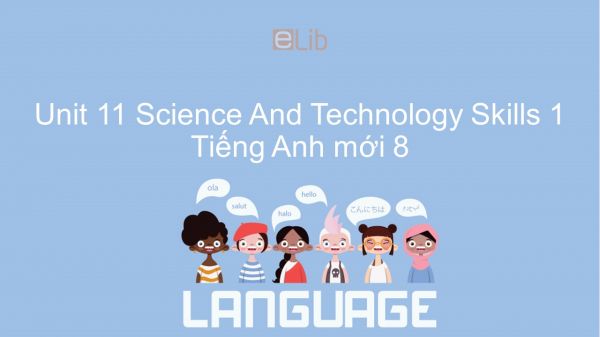
1. Reading
1.1. Task 1 Unit 11 lớp 8
Quickly read the passages. Match the headings with the passages. (Đọc nhanh đoạn văn. Nối tựa đề với đoạn văn.)
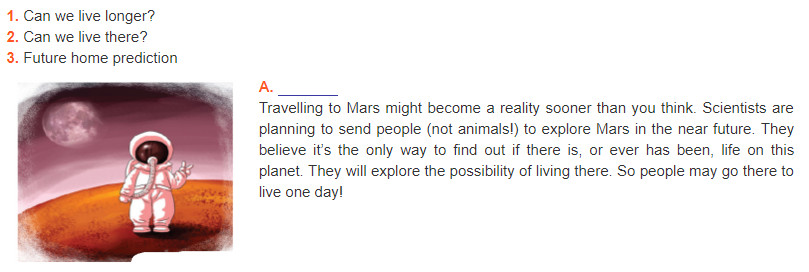
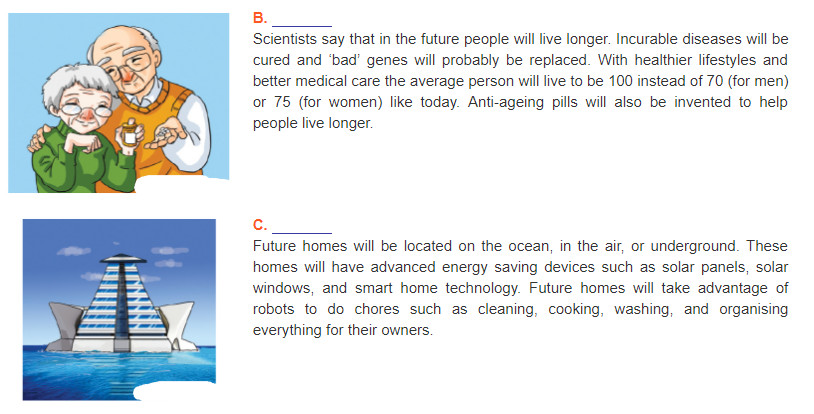
Guide to answer
A-2 B-1 C-3
Tạm dịch:
Chúng ta có thể sống ở đó chứ?
Du lịch đến sao Hỏa có thể trở thành hiện thực sớm hơn bạn nghĩ. Các nhà khoa học đang lên kế hoạch đưa con người (không phải động vật) khám phá sao Hỏa trong tương lai gần. Họ tin rằng đó là cách duy nhất để tìm ra liệu rằng có sự sống, hoặc thậm chí là đã có sự sống trên hành tinh này hay không. Họ sẽ khám phá khả năng sống ở đó. Vì vậy con người có thể đến đó để sống một ngày nào đó!
Chúng ta có thể sống thọ hơn chứ?
Các nhà khoa học nói rằng trong tương lai người ta sẽ sống lâu hơn. Những căn bệnh không thể chữa trị sẽ được chữa trị và những gen "xấu" sẽ có thể được thay thế. Với lối sống khỏe mạnh hơn và chăm sóc y tế tốt hơn một người trung bình sẽ sống đến 100 tuổi thay vì 70 (ở nam) hay 75 (ở nữ). Thuốc chống lão hóa cũng sẽ được phát minh để giúp người ta sống thọ hơn.
Dự đoán nhà cửa trong tương lai
Nhà cửa trong tương lai sẽ tọa lạc trên biển, trên không, và dưới lòng đất. Những loại nhà cửa này sẽ có thiết bị tiết kiệm năng lượng tân tiến như tấm pin năng lượng mặt trời, cửa sổ mặt trời và công nghệ nhà cửa thông minh. Nhà cửa trong tương lai sẽ tận dụng lợi ích của người máy để làm các công việc nhà như lau dọn, nấu ăn, giặt giũ và tổ chức mọi thứ cho người chủ.
1.2. Task 2 Unit 11 lớp 8
Underline the following words and phrases in the passages in 1.1. Match each of them with its explanation. (Gạch dưới những từ và cụm từ sau trong đoạn văn phần 1.1 Nối mỗi cái với giải thích của chúng.)
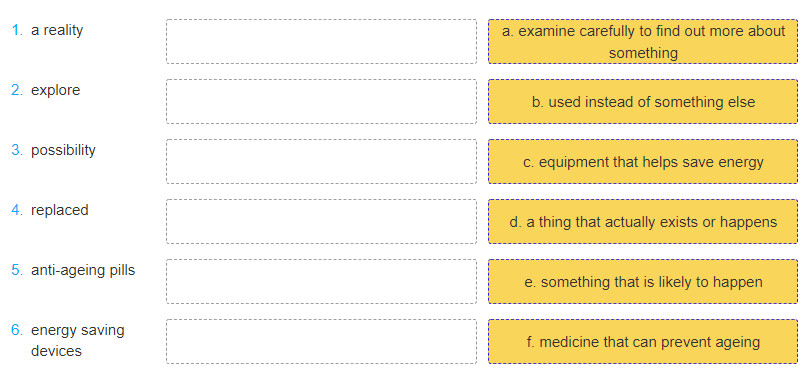
Guide to answer
1-d. a reality - a thing that actually exists or happens
(hiện thực - một điều mà thực sự xảy ra hoặc tồn tại)
2-a. explore - examine carefully to find out more about something
(khám phá - kiểm tra cẩn thận để tìm hiểu thêm về điều gì)
3-e. possibility - something that is likely to happen
(khả năng - điều gì đó mà có thể xảy ra)
4-b. replaced - used instead of something else
(thay thế - được thay bằng cái gì khác)
5-f. anti-ageing pills - medicine that can prevent ageing
(thuốc chống lão hóa - thuốc mà có thể ngăn lão hóa)
6-c. energy saving devices - equipment that helps save energy
(thiết bị tiết kiệm năng lượng - thiết bị mà giúp tiết kiệm năng lượng)
1.3. Task 3 Unit 11 lớp 8
Answer the questions. (Trả lời câu hỏi.)
1. Why are scientists planning to send people to Mars?
(Tại sao những nhà khoa học đang lên kế hoạch đưa con người đến sao Hỏa?)
2. How will anti-ageing pills help people? (Thuốc chống lão hóa sẽ giúp con người như thế nào?)
3. How long does an average person live now? (Một người trung bình sống bao lâu bây giờ?)
4. What are some energy saving devices? (Thiết bị tiết kiệm năng lượng là gì?)
5. What will home robots do in the future? (Người máy gia đình làm gì trong tương lai?)
Guide to answer
1. They send people to Mars to explore if there is life there.
(Họ đưa con người đến sao Hỏa để khám phá rằng có sự sống ở đó không.)
2. They help people live longer. (Chúng giúp con người sống thọ hơn.)
3. 70 for men and 75 for women. (70 tuổi đối với nam hoặc 75 tuổi đối với nữ)
4. Solar panels and solar windows. (Tấm pin mặt trời và cửa sổ mặt trời.)
5. They can do chores such as cleaning, cooking, washing, and organizing things.
(Chúng có thể làm những công việc nhà như lau dọn, nấu nướng, giặt giũ và tổ chức công việc.)
2. Speaking
2.1. Task 4 Unit 11 lớp 8
Think about your ideas about scientific advances in these fields. Look at the example and make notes. (Nghĩ về ý của em về tiến bộ khoa học trong những lĩnh vực này. Nhìn vào ví dụ vả ghi chú.)

Guide to answer
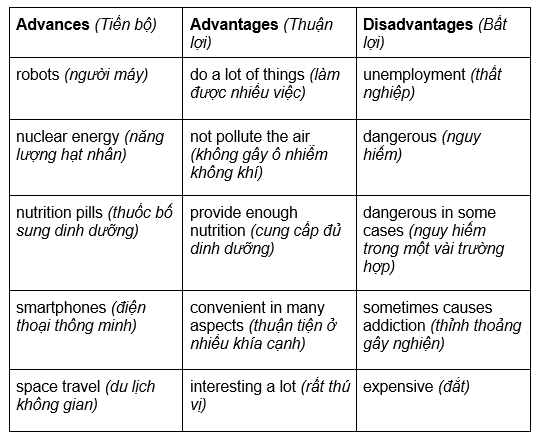
2.2. Task 5 Unit 11 lớp 8
Work in groups. Express your agreement and disagreement about how scientific advances can help us solve problems in the future. (Làm theo nhóm. Thế hiện sự đồng ý và không đồng ý về những tiến bộ khoa học có thể giúp chúng ta giải quyết những vấn đề trong tương lai.)
Example:
A: I think robots will help us do many boring or difficult jobs.
B: Yes. But at the same time, they may bring a lot of unemployment.
C: And they’ll make us lazy and inactive.
Tạm dịch:
A: Tôi nghĩ rằng người máy sẽ giúp chúng ta làm nhiều việc nhàm chán và khó khăn.
B: Đúng vậy. Nhưng cùng lúc đó, chúng có thể mang đến nhiều sự thất nghiệp.
C: Và chúng sẽ làm cho chúng ta lười biếng và thụ động.
Guide to answer
A: In my opinion, solar energy will be used by almost people in the world in the next 50 years.
B: I absolutely agree with you. It will help environment a lot.
C: And we won’t be worried about lack of energy.
Tạm dịch:
A: Theo quan điểm của tôi, năng lượng mặt trời sẽ được sử dụng bởi đa số mọi người trên thế giới trong vòng 50 năm tới)
B: Tôi hoàn toàn đồng ý với bạn. Nó sẽ giúp ích cho môi trường rất nhiều.
C: Và chúng ta cũng không cần phải lo lắng về việc thiếu năng lượng.
3. Practice Task 1
Read the passage below and decide whether the statements are TRUE or FALSE?
Inventions That Changes Our World
People have been inventing things for years. Paper was invented about 2,000 years ago. The wheel was invented more than 5,000 years ago. What would life be like without paper to write on or bikes to ride? Those inventions have made life easier.
Airplane
The Wright Brothers invented the first airplane in December 1903. That makes 2003 the 100th anniversary! Before the airplane was invented, most people traveled by cars, boats, and trains. Today, airplanes help people travel faster. How do airplanes help you?
Telephone
Alexander Graham Bell invented the telephone in 1876. Before the telephone was invented, people kept in touch by writing letters or talking in person. Today the telephone makes it easier for people to talk to one another. How do telephones help you?
Automobile
The first four-wheeled gas-powered car was invented by Karl Benz in 1891. Before people had cars, they couldn’t travel easily. They walked or rode horses for short trips. They took trains or boats for long trips. Today cars are one of the main ways people travel. How do cars help you?
Computer
People worked for years to make the first computer. It was built in 1946. The first computer was called ENIAC. Today computers are an important part of many people’s lives. People use computers as tools to write, get information, and much more. How do computers help you?
Question 1: The wheel was invented more than 5 thousands years ago.
Question 2: Before the airplane was invented, people traveled around on foot.
Question 3: Alexander Graham Bell invented the telephone in 1876.
Question 4: Before the invention of automobiles, people walked or rode horses for long trips.
Question 5: People use computers as tools to write, get information.
4. Practice Task 2
Choose the letter A, B, C or D to answer these following questions
The history of the computer in the twentieth century is one of dramatic adaption and expansion. The computer had modest beginnings in areas where it was used as a specialist tool. The first electronic computer was built in the 1930s and was solely for use of undergraduate students in Iowa State University to handle mathematical computations in nuclear physics. In World War II, computers were developed in order to wage counter espionage and break codes used by the enemy. In the post-war years the scope of computers was expanded to include the military industrial complex and academia. Obviously people needed to travel around these institutions and so there was a need for early network tools. In the 1960’s an early version of the Internet, ARPPANET was used in computers were starting to change our lifestyle, the way we do business and many style things (Elliot, 1994) and by the late 1980s, networks were expanding to embrace sections of the general public. The internet was born.
Question 1: When was the first electronic computer invented?
A. in the 1920s B. in the 1930s C. in the 1940s D. in the 1950s
Question 12: In World War II, computers were developed in order to____________.
A. break enemy’s code B. call other soldiers
C. do calculations D. study geography
Question 3: Why was the scope of computer expanded in the post-war year?
A. to teach at academic school B. to sell to other countries
C. to spread knowledge D. to include the military industrial complex
Question 4: What is the name of the early version odd the Internet?
A. INTRANET B. CONPANET C. INTERNET D. ARPPANET
Question 5: When were networks expanded to serve general public?
A. by the late 1980s B. by the late 1970s
C. by the late 1990s C. by the late 1960s
5. Conclusion
Kết thúc bài học, các em cần luyện tập đọc hiểu về cuộc sống của con người trong tương lai, tập nói về các tiến bộ khoa học với các mặt lợi và mặt hại của chúng; đồng thời ghi nhớ các từ vựng sau:
- reality (n): hiện thực
- explore (v): khám phá
- find out (v.phr): tìm ra
- possibility (n): khả năng
- incurable (adj): không thể chữa trị
- lifestyle (n): phong cách sống
- medical care: điều trị y tế
- anti-aging: chống lão hóa
- energy saving: tiết kiệm năng lượng
- take advantage of: tận dụng
Tham khảo thêm
- doc Unit 11 lớp 8: Science And Technology - Getting Started
- doc Unit 11 lớp 8: Science And Technology - A Closer Look 1
- doc Unit 11 lớp 8: Science And Technology - A Closer Look 2
- doc Unit 11 lớp 8: Science And Technology - Communication
- doc Unit 11 lớp 8: Science And Technology - Skills 2
- doc Unit 11 lớp 8: Science And Technology - Looking Back
- doc Unit 11 lớp 8: Science And Technology - Project
